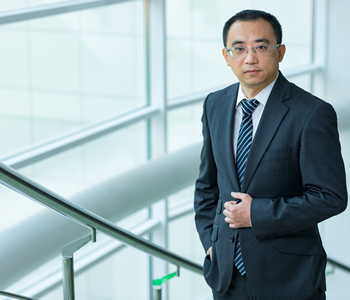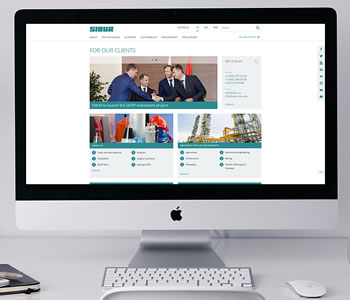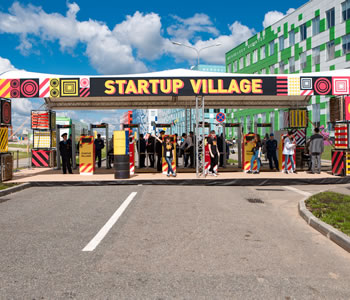SIBUR has been running this innovation contest since 2010. In the first five years, over 1,000 projects were submitted for the IQ-CHEM Awards. Partly due to a strong interest the contest sparked in 2016, it was decided to reshape the contest. SIBUR’s initiative was supported by foreign petrochemical companies such as Dow Chemical, DuPont, Solvay, 3M, AkzoNobel, BASF, LG Chem, Henkel, Linde, Technip, and Honeywell UOP. IQ-CHem is now a global platform. The contest is open for any author of an innovative project that can be further adopted by the contest partners.
Savings and safety of the environment
The IQ-CHem results were announced in June at the Skolkovo Startup Village conference, one of Europe’s largest forums for innovative entrepreneurs. The Canadian project Pyrowave won the first prize for a new way of recycling plastic waste.
With the existing technologies, processing companies can specialise in only one kind of polymer. This hampers the industry development as it requires careful feedstock sorting. The Pyrowave team found the way to streamline this process. “It’s like un-zipping the plastic into their initial constituents with the very targeted action of microwaves so that plastic manufacturers can easily re-zip them into new plastics that can be used in identical applications,” said Jocelyn Douce, Head of Pyrowave, about his project. The company’s facilities can process up to 100 kg of waste per one 30-minute cycle. The operator claims to supply as many “microwave ovens” as needed to meet a client's objectives. The company claims that the processing method ensures minimal losses. For example, polystyrene waste is converted into styrene monomer with a return of 90%.
“Yet another waste management project made it into the final. This means that the issue is quite pressing,” said Maxim Bardin, Senior Project Manager at Skolkovo Foundation and expert at IQ-CHem’s mentor sessions. It was the Russian company NKP POF that came up with the project. It is engaged in streamlining the technology of handling highly contaminated plastics, which are often not recycled. The company suggests using a special cassette filter to melt plastics. “It has a large filtration area (2.5 m2 vs 700 cm2 for the best comparable offerings) resulting fr om a 3D construction design. Our system traps more impurities. We will be able to extract up to 95% of quality plastic from waste which has not previously been recycled,” says Sergey Kapinos, Executive Director of SPK POF.
Poised to win
The second place was shared by two US companies. Compact Membrane Systems (CMS) introduced innovative membranes simplifying the process for separating olefins from paraffins. The competitive edge of membranes is modular design, which helps to easily adapt them to existing production. The CMS product is not the first of its kind, but it is durable (service life is 300 days) and resistant to aggressive environments. “We are proud to be actively promoting innovative and ground-breaking technologies, as we fundamentally change the way manufacturers view critical production processes and help to cut energy consumption,” says Erica Nemser, CEO of CMS.
Another runner-up, New Sky Energy, presented a new technology for purifying hydrocarbons from sulphur compounds by using the so-called gas sweetening, which removes H₂S from various types of natural gas. Its main advantage is the regeneration of the sulphides capture agent, which helps to reduce operating expenses by up to 90% compared to conventional absorbers. The new method is already successful. Currently, New Sky Energy operates two facilities scrubbing gas produced in Wyoming (USA).
Since this year, a face-to-face round has been introduced – now the participants present their projects to the jury.
Simple reforming
The ideas of boosting the traditional process efficiency were also suggested by the Russian participants. One of the initiatives that ranked third was the joint Russian-Swiss project on the technology of methanol production from methane. This alcohol is widely used in the production of varnishes, paints, solvents and even biofuels. Methanol very rarely occurs naturally. The production technology affects both the volume of the substance produced and the value of the resulting products.
Currently, it is a two-stage process: first, carbon monoxide and hydrogen are obtained by steam reforming of methane. Following purification, this mix is used in the synthesis of methanol. “Our technology implies a one-stage conversion of methane to methanol in a single reactor and under milder conditions (with pressure and temperature several times lower), which reduces the list of necessary equipment and energy costs. We use non-standard catalyst composition to do this,” says Vitaly Sushkevich, researcher of the Laboratory of Kinetics and Catalysis, Division of Physical Chemistry, Lomonosov Moscow State University. In this international team, Vitaly Sushkevich represents Russia.
Promising ideas
Some of the projects were not recognised, but participants believe that they will make use of the experience. Since this year, a face-to-face round has been introduced – now the participants present their projects to the jury. In addition to SIBUR’s CEO Dmitry Konov, it comprises CTOs of chemical companies partnering IQ-CHem. “An additional advantage was the opportunity to put forward ideas to representatives of major businesses, which are usually difficult to reach out to. Here, it could be even quite informal,” said Vitaly Sushkevich.
One of the bright, though not recognised, ideas was fire extinguishing media to be used on alkali, alkaline earth and light metals and alloys. When processing magnesium parts (by defence companies), magnesium chip can easily catch fire. Fire extinguishing is a difficult task: water contact may cause explosion, sand may intensify fire, fluxes may cause sparking and release of hazardous substances. Fire extinguishing media presented at the contest can address this issue. It is a special solution compound featuring macromolecules which look like claws. When interacting with burning magnesium, they block the atoms of metal and prevent them from reacting with oxygen (by creating a strong film on their surface), thus stopping the fire. “This liquid is already being used at the Avangard plant (wh ere missiles for the ABM systems are produced – Ed.). The Ministry of Emergency Situations certification tests (to be completed in September) will open up more opportunities to market our product. The growing use of our fire extinguishing media will contribute to better safety of magnesium parts manufacturing and therefore broaden the scope of magnesium application,” says Igor Zelmanov, Head of the Hyperion Innovation and Technology Centre. Magnesium has a number of advantages: It is lighter and stronger than aluminium, and therefore is a good alternative to it.
The project for the production of antimicrobial polymers, scarcely manufactured in Russia, is also very promising. The IQ-Chem participants proposed a breakthrough solution. Antimicrobial plastics are usually made using silver. The contest participants suggest using chelated zinc compounds instead, which have the same antimicrobial properties, but are cheaper. “Our lab’s team can add chelated zinc compounds to several kinds of polymers (ABS, polyethylene, polyvinyl chloride) serving as a basis for a wide range of products. Antimicrobial materials are the point of focus for medicine, but the food industry can also apply them. We have already tested the packaging made from antimicrobial plastic, it contributes to extended shelf life,” says Anton Burenkov, Promotion manager at Laboratory BIO Zet”.
An additional advantage was the opportunity to put forward ideas to representatives of major businesses.
Single database
In addition to encouraging the scientific teams, the organisers intended to set up a mechanism for building strong global technology partnerships. The development of the contest shows the need of large industrial companies for new ideas and technologies, and also enables promising start-ups to mature by partnering with a major business.
“Continuous development of technology is indispensable for petrochemical companies. Such technology design is increasingly driven by small companies and start-ups (rather than corporations) targeting one particular solution. The quantity and quality of applications we received in 2017 reveal a huge potential for attracting open petrochemical innovations. The IQ-CHem platform was created to harness this potential into real projects,” said Dmitry Stepkin, Head of Corporate R&D at SIBUR. Besides, any technology company always seeks to find and roll out new product and technology solutions. SIBUR keeps streamlining both production processes and new products. The IQ-CHem contest helps to spot the key innovative trends in the industry and offer cutting-edge solutions to our customers.
The IQ-CHem contest helps to spot the key innovative trends in the industry.
Download PDF


























IQ-CHem in 2017
USD 300 bn is the total turnover of the contest partners
251 teams
27 countries
6 winners from Canada, USA, Russia, Belgium, and Switzerland